Competence and Likability as Keys to Success
Tom Osborne, Former VP, Design
Article Category:
Posted on
I’m glad I caught the podcast of Karen McGrane’s Closing Plenary from the 2013 IA Summit (transcript and audio available here)—I only wish I could have been there to hear it live. While full of wisdom, there was one piece of her talk that kept replaying in my head. In it, she describes a graph with two axes:
“Another way to put this is, all of the people that you work with, you could rank them on two axes, how good they are at their job, how competent they are, and how likable they are. So if you are both competent and likable, you are a dreamy rock star and everybody will want to work with you.”
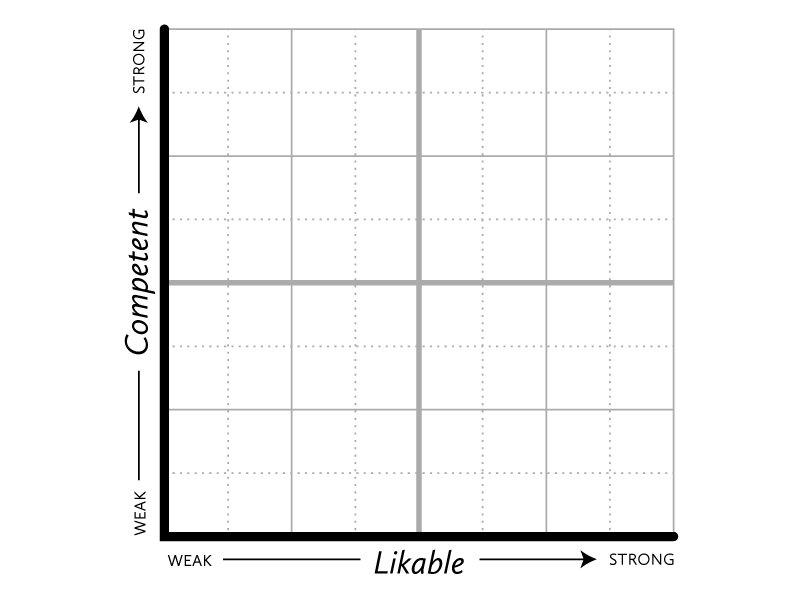
She goes on to describe how the two axes form four quadrants. The quadrants represent four personas: incompetent jerks, competent jerks, lovable fools, and rock stars.
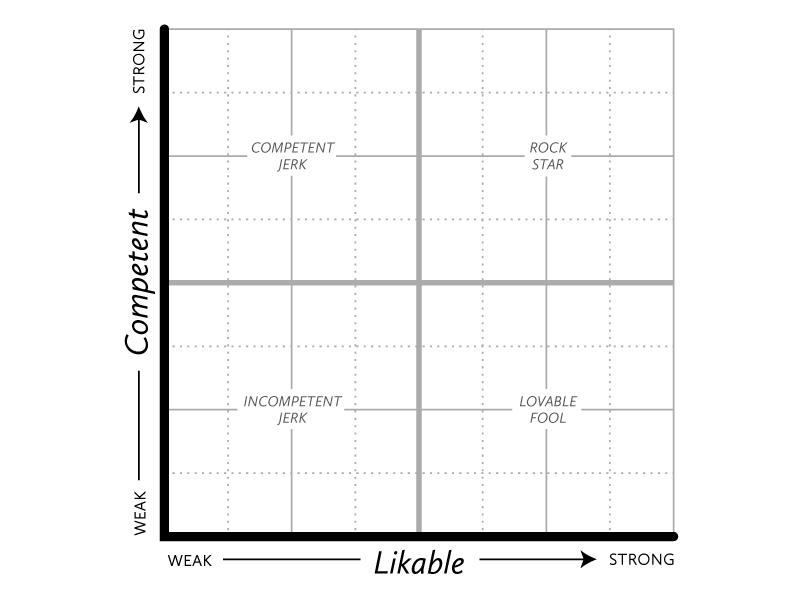
She explains how the competent jerks and lovable fools add complexity to a working environment.
“Do you know who the most damaging people are in an organization? It’s the competent jerks. It is the people who, by the fact that they are good at their job, stick around in the organization but they limit the organization’s ability to evolve, to change, to grow, because they are not a good cultural fit, because they have a bad attitude, because they don’t collaborate well, because they’re jerks to be around.”
“Do you know who the most valuable people in the organization are, especially in terms of effecting change? It is the lovable fools. They are the social glue that keeps the organization together. They are the people who can socialize ideas, can bring information from one group to another. They provide the lubrication that keeps that organization running smoothly.”
Karen presents an interesting concept here, but seems to omit an equally important issue: the fact that I don’t want to work with competent jerks OR lovable fools. I only want to work with the rock stars—people who are both extremely competent and wonderfully likable. Is that really too much to ask? And is that even possible?
Well let’s think about it. What if your hiring standards were so high that you never hired the jerks and fools in the first place? What if you only hired rock stars? And how would you go about doing that?
Competence gets a foot in the door.
I believe competence and likability are fairly simple to evaluate—at least sufficiently to know whether or not to proceed with an interview. You can evaluate competence by looking at a resume or reviewing a portfolio. Sometimes a simple quiz or homework assignment is needed for further assessment. Someone who exhibits reasonable competence and likability can easily earn an interview.
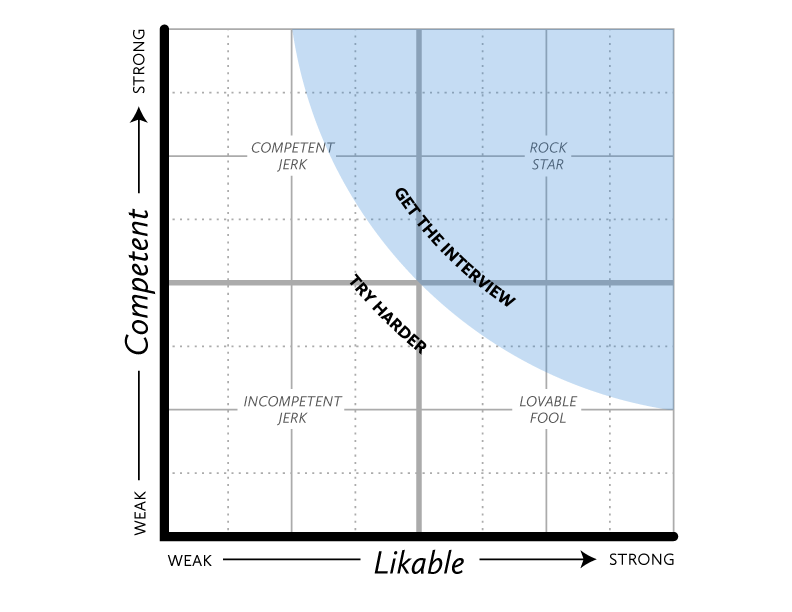 Likability gets the job.
Likability gets the job.
But likability, that’s tougher. Or is it? You wouldn’t hire someone based on his or her likability alone. I have lots of friends who are likable but I wouldn’t necessarily hire them to work with me. So likability is somewhat secondary to competence—although someone who is highly likable and a quick study could be a person with immense potential. Someone who exhibits both high competence and likability surely has a great chance of landing the job.
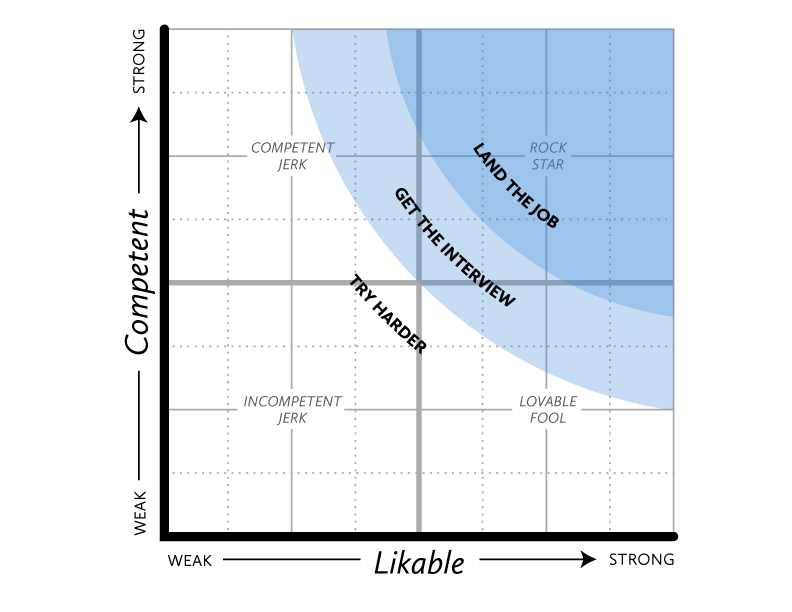
Striving for both is the key to success.
But what happens next? How does a candidate—now employee—live up to the expectations he set when he was trying to be at his best, and how does he exceed expectations once he’s landed the job? It’s easy to get comfortable in a job once you’re in. Comfortable is...well, it’s comfortable! But it may not get you very far.
I believe achieving success is simple if you keep to the path we’ve illustrated so far. Work hard to improve your competency—this means making time for professional development to improve your knowledge and skills. Then learn what people like—and don’t like—about working with you. Amplify the good, and work hard to improve the bad. If your workplace doesn’t provide peer reviews, create your own and solicit your co-workers’ feedback, even if it’s anonymous.
Competence gets a foot in the door. Likability gets the job. Striving for both is the key to success.
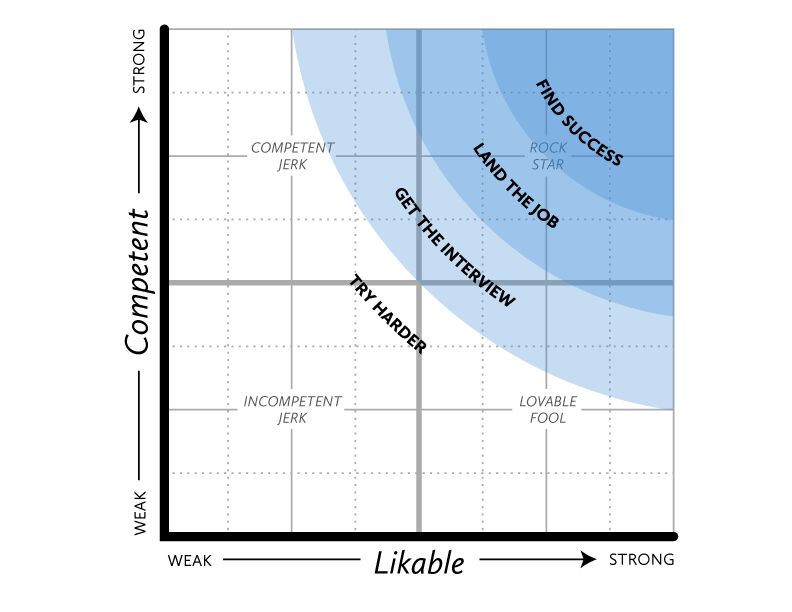
You can become the rock star you were born to be, but no one just sits back and “becomes” a rock star. Strive to improve your work and your ability to work with others, and before you know it, you’re signing autographs and noshing on bowls of hand-selected green M&Ms.
Or maybe just succeeding wildly at a job you love.
Thank you, Karen for planting a seed.